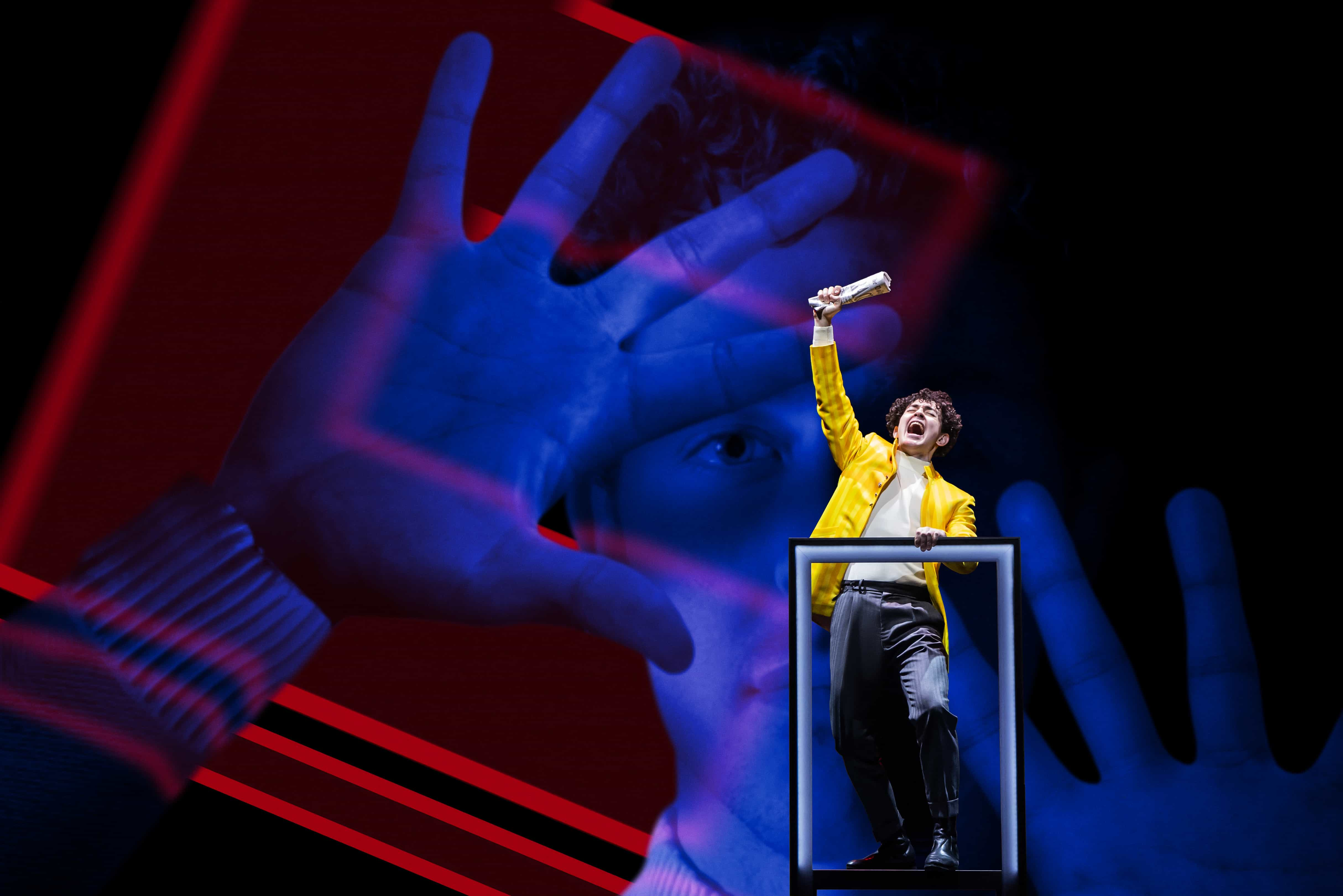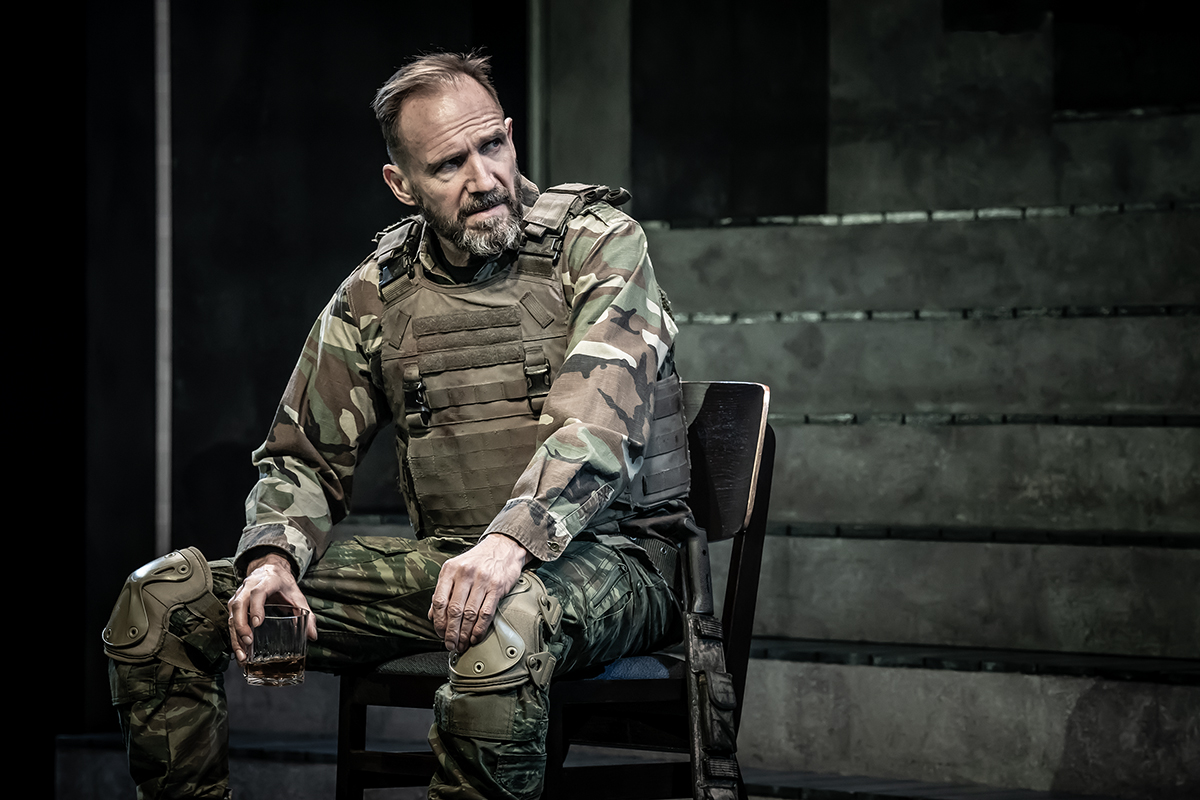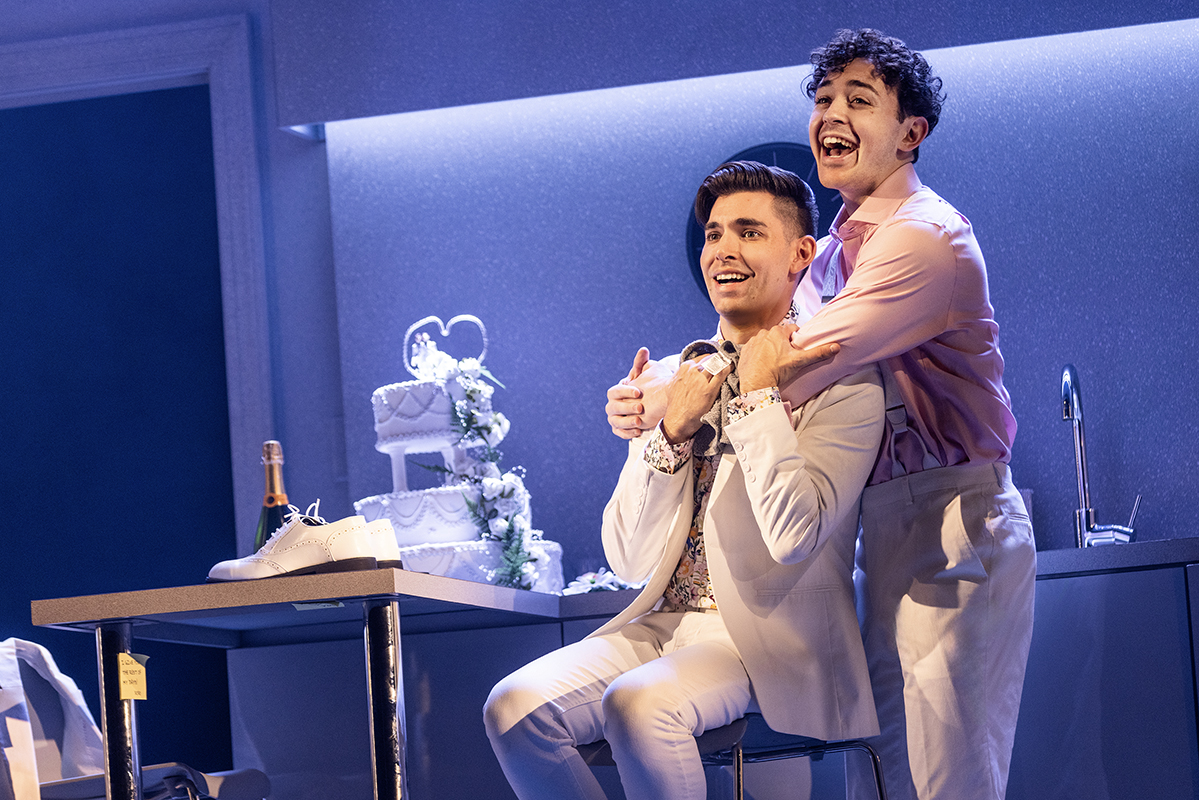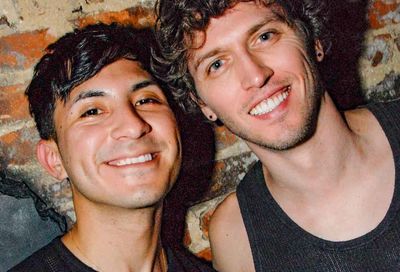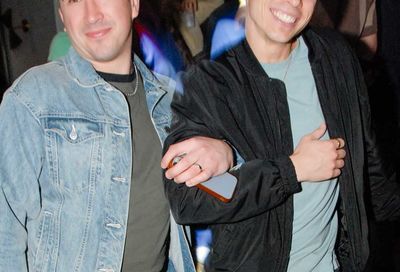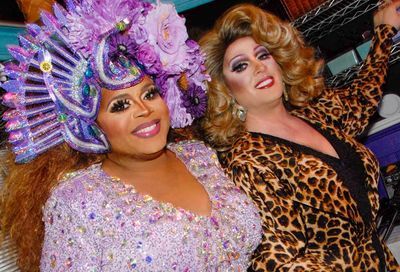Signature Achievement: Eric Schaeffer celebrates 30 years of groundbreaking theater in Virginia
In 1989, Eric Schaeffer founded Signature Theatre. It would become one of America's finest regional theaters.

Matthew Gardiner has worked for Eric Schaeffer for 13 years and counting.
“I don’t want to blow his head up too much,” Gardiner laughs, “but he is the best boss — truly.” For starters, Gardiner says the co-founder and artistic director of Signature Theatre “doesn’t think of himself as the boss, he thinks of himself as one of a team, and he thinks of himself as creating a community. And that’s really special.”
Signature’s Associate Artistic Director considers himself “very lucky” that Schaeffer hired him right after he graduated from Carnegie Mellon University in 2006. “He took a chance on me, and gave me the opportunity to direct at Signature when I was only 24 years old,” says Gardiner, now 35. “That’s pretty amazing. And it says something about his ability to take risks, in all aspects.
“I’m always so amazed by the many plates that he’s able to juggle and the many balls that he’s able to keep in the air at any time,” he continues. “He’s always working on a million things, and dreaming of a million things for the future for Signature.”
Maggie Boland couldn’t agree more. “I just can’t believe how many plates he can keep spinning at the same time,” says Boland, Signature’s Managing Director, who adds that Schaeffer “is the most entrepreneurial person I’ve ever met…. He works at a higher capacity level than anybody else I know. And he’s always thinking about how to make Signature better.”
Boland also says Schaeffer has treated her as his equal in heading up the company since she came on staff 11 years ago. “What’s great about him as a partner is that he actually wants to have a partner,” Boland says. “He doesn’t want to be charging out there alone in making decisions or shaping the organization’s future…. We just communicate constantly and really like each other, which is an awesome side benefit. We have a lot more fun at work than I ever thought an adult could.”
As it happens, everyone at Signature Theatre is in a particularly celebratory mood these days, given the theater company’s upcoming 30th anniversary. What began as a community-focused suburban professional troupe became a theatrical juggernaut, and the leading purveyor of musicals in Washington’s thriving theater community.
Schaeffer and Signature have also become the nation’s central champions of the works of Stephen Sondheim, and the company’s 30th anniversary season will kick off in August with a Schaeffer-helmed production of Assassins that will mark Signature’s 30th production of a Sondheim musical — the most produced by any one theater in America. Schaeffer has also helped shepherd and lead multiple shows to Broadway, including Follies, the Kennedy Center’s noteworthy 2011 revival of the Sondheim musical starring Bernadette Peters.
At the moment, Schaeffer is focused on the World Premiere of Blackbeard, a new musical with book and lyrics by John Dempsey and music by Dana P. Rowe, the same team behind previous Signature standouts The Witches of Eastwick and The Fix.
“John and Dana have been here the whole time, really working hard,” says the 57-year-old Schaeffer. “David Holcenberg was the music director on Matilda and Groundhog Day in New York, and he is the music director ,but also one of the orchestrators. The other orchestrator, Scott Wasserman, is the programmer from Hamilton. So with the two of their minds together, they’re bringing the music to life in this amazing way that is just really spectacular.”
Since 1989, Signature has carved a niche for itself, not just in terms of musicals, but in terms of quality. It raised the musical theater bar so incredibly high, all other theaters had no choice but to follow suit. Still, when you attend a musical at Signature, more often than not you’re in for an evening that pays tribute to the art form while reinvigorating it. The company has a fistful of Helen Hayes Awards to show for its efforts, and, in 2009, was presented with the prestigious Regional Theatre Tony in recognition of its consistent artistic excellence.
Perhaps, however, Gardiner sums it up it best.
“There have been many opportunities that have been presented to me to leave,” he says. “To be the artistic director in other theaters. But I don’t get the commitment to what I’m interested in — in terms of musical theater and new works and contemporary plays — the way that Signature does. Signature’s just a really unique, special place.”
METRO WEEKLY: Let’s talk about your new musical, Blackbeard, which just opened in previews.
ERIC SCHAEFFER: Blackbeard is something like we’ve never done at Signature before. People are not going to expect what they get when they see it. It’s also maybe one of the hardest things we’ve ever done. New musicals are hard to begin with, but this musical is really complicated because there are 10 actors playing over 60 roles. And musically, the styles go all over the map, in a great way. It’s very eclectic. As I said to the cast, we want the audience to feel like they’re getting on a rollercoaster and the best amusement park ride they’ve ever been on. And they’re not going to know where they’re going to go or where they’ll end up.
It’s fun because there are sword fights, there are gun fights, there are dead pirates, there are alive pirates — there’s everything. We go to Japan, we go to India, we go to Norway. It’s this 90-minute jaunt around the world. I think it’s perfect for the summer.
MW: Broadway veteran Chris Hoch makes his Signature debut as Blackbeard, leading a cast including two performers often identified as “Signature favorites” — Nova Y. Payton and Bobby Smith.
SCHAEFFER: Yeah, and you get to see them stretch muscles that they don’t normally stretch. I’ve never seen Nova do what she’s doing in the show. Or Bobby. I think audiences are going to particularly love Bobby’s Judy Garland imitation that comes out.
MW: He does that in Blackbeard?
SCHAEFFER: Oh, yeah. Let’s just say, there’s a drinking contest and he loses.
MW: As it turns out, you’re also directing Smith and Payton as part of the cast of Assassins. What inspired you to return to that Sondheim show?
SCHAEFFER: This is actually the third time we’ve produced it. I directed it 27 years ago, and I’m excited to go back to it. I felt like it was the right time to do this show in today’s world. I think the whole political climate, and how politics is so polarizing right now, and how you can understand people’s frustrations — it’s almost like there are no rules anymore. Assassins really magnifies that.
MW: How are you approaching it differently than in the past?
SCHAEFFER: The physical design is totally different. And I think it’s going to have a much different resonance than it did 27 years ago. It’s really going to affect people in a different way. When we decided to do it as a kick-off to the 30th anniversary, we cast it with people who have all worked at Signature. So they’re all part of the Signature family. To really make it a celebration.
MW: It’s certainly worthy of a celebration. What pops to mind when you reflect on the milestone?
SCHAEFFER: I think it’s been an amazing time and an amazing journey of 30 years. Seeing how the theater’s grown over that time from starting out as this little idea to what it’s become. And I look at all the artists that have been able to work here. And the work that we’ve done and how eclectic it is and continues to be. When you look back at it and you see all the shows in a list, it’s kind of amazing, really.

MW: What inspired you to start a theater in this region in the first place?
SCHAEFFER: I’m originally from this little town called Fleetwood, Pennsylvania, in the middle of Amish country, and we had one traffic light and that was about it, and a curfew at ten o’clock at night. When I moved down here, I was doing community theater, and that’s where I met Donna Migliaccio. And we were both on different boards — I was on the board of the Arlington Players, and she was on the board of Dominion Stage. And I just remember we both were trying to get them to do more cutting-edge work. Sometimes they would, and sometimes, more than likely, they wouldn’t — and I totally understand that. But one night we just had a discussion: “Hey, maybe we should start a theater.” It was just one of those off-the-cuff discussions. And then the next day, she asked, “Were you serious?” And I said, “Yeah, why not?” Because I was 27, young, and naïve, and thinking like, “Oh, the grass is greener everywhere.”
Also, at the time, there was no professional theater in Arlington. That was a big thing. It was the late ’80s, and so there was that mentality of people in Virginia didn’t go into D.C. at night. Everyone kind of stayed in their own neighborhoods. So we just thought there’s an audience here that would actually love a contemporary theater, and we just thought the time felt right: “Let’s do it.” And that’s really how it started.
MW: So you conceived of it not as a D.C.-area regional theater but as merely a Virginia-based organization?
SCHAEFFER: We totally did. From the very beginning, we sat down and made a five-year business plan and said, “This is what we want to do in the first five years. And if it’s successful, we’ll see how it goes.” The interesting thing is, by the end of the second year, half into the third year, we had hit all those goals. And so then we did a new set of goals. It was always about filling a need in the community: there wasn’t a professional theater here, and we just wanted to make one.
The other thing I remember from the beginning is, I had done some set design down at the Source Theater when that was running, and it was very bare-bones. I felt really passionate about wanting the acting on stage to be just as strong as the design — to make everything equal, that one wasn’t given more attention than the other. And we’ve really tried, throughout our history here at Signature, to keep that.
MW: Along the way, Signature Theatre became known as the preeminent musical theater company in the area.
SCHAEFFER: What’s interesting is, we never set out to be that. The first year we only did plays. The first year, Donna and I, we just ran the company. I didn’t direct anything. It was about making sure the theater was successful.
And then the second year was the first time we did a musical. We did Sweeney Todd. Then the third year we did Assassins. And then people would ask, “What’s the next Sondheim musical?” The audience planted that idea. That’s really how the Sondheim annual show came into being. It wasn’t like a brainchild of anyone’s but the audience’s. We thought, “Oh, we better do another one.” And then after that, we automatically went, “Well, what’s our Sondheim going to be?” And it became a staple. Those shows in the early years really became successful, so then we thought, “Maybe we should do two musicals.” And then it became three musicals, and then we were doing five shows [a season] and more musicals. So it’s just grown and grown.
MW: How long was it before you were able to stop doing non-theater work to pay the bills after starting the company?
SCHAEFFER: It wasn’t until the ninth season when I finally stopped as the art director at WETA. It just became too much. I remember I didn’t know how my parents would take it. I called them and I said, “I just want to let you know, I’ve decided to work full-time at the theater.” I remember my mom’s response. She was a nurse, and she asked, “Do you have health insurance at the theater?” And I said, “Yep.” And she was like, “Well, that’s all I care about. Do what you want to do. That’s great.” They were really supportive and great about it.
MW: Is your family still supportive? Do they come to see shows?
SCHAEFFER: Oh yeah. My dad’s a donor to the theater.
And he comes. He’ll bring a bus from my hometown. They pick a show, “Oh, the Fleetwood bus is coming.” We’ll get 54 of them on the bus and they’ll come down for the day and see a show.
MW: Who comes with him, friends?
SCHAEFFER: My brother organizes it. He has an email list, because all these people have been coming. And literally the bus fills up in 24 hours. He has a waiting list because everyone wants to come.
MW: Have they planned next year’s show yet?
SCHAEFFER: Oh, yeah, they’re coming to A Chorus Line. He’s already picked it.
MW: Is it true that you’re pretty much all self-taught when it comes to your work in theater, including directing?
SCHAEFFER: Yes, I am. I’ve learned from seeing the great shows and also the terrible shows. You learn from going to the theater — you see things that work and that don’t work.
MW: Have you noticed any changes in overall stage direction, or perhaps of your individual directing style, since you first started?
SCHAEFFER: Not that I can think of. With all the technology and everything that’s changed over the years, it still goes back to the same thing: What is the story you’re telling and why are you telling it? I think as long as you know that and understand that, you’ll be okay.
Another thing I’ve learned is: Only do stuff that you really want to do. It’s okay to say no to something. I’ve done some stuff over the years where I thought, “I shouldn’t have ever done that.” So, now I don’t. I’ll say, “No, this is what I want to do. I’m not going to do that.” I’d rather not do anything than just do it to say I did it, because it’s not going to be good for myself and it’s not going to be good for the audience or the actors. I think that’s really important.
MW: I don’t suppose you’d be willing to share an example of what you’re referring to.
SCHAEFFER: [Laughs.] No, I don’t want to share that! That’s on my private list.
MW: It seems a safe bet that Titanic is not on that list. Is it true your 2017 production of that blockbuster may yet see the lights of Broadway?
SCHAEFFER: That’s the plan. We’re waiting to get a theater. There’s a producer who did some auditions already. Next season is the hope. I think people thought, “How is Signature going to do this? They’ve lost their minds.” I’ve always loved the show, and I’ve always wanted to do it — and it was one of those where I had this idea of how to do it. But that’s an interesting case in point of not staying in a box. We’re always pushing boundaries, trying to do something that’s different and trying to reinvent in a bigger way.
It’s the same thing with A Chorus Line, which we’ve never done. I think people think, “Oh, Signature wants to do A Chorus Line,” we make a phone call, and it’s, “Oh, here you go, you can do the show.” And that’s not the case at all. It took almost a year to get the rights to do A Chorus Line, and part of that was because we’re not going to be doing the original choreography. Denis Jones, who choreographed Tootsie, is doing all new choreography. So working all of that out with the estates and the rights holders took a long time — to get them to allow us and to trust us to do it, because it is a masterpiece. So that’s what’s really, really exciting about that show. To be able to see it in an intimate setting, that you feel like you’re actually in the room with them. And then to be able to see it has a whole new life. Are people going to fall over if Cassie’s not in a red dress? Well, she may not be. But that’s what’s great. And that’s Signature, I think, in a nutshell.

MW: Are you directing that?
SCHAEFFER: No, Matt Gardiner is. He’s working with Jason Sherwood, who designed Billy Elliott for us but also did Rent Live. So the concept of the set design is totally fresh and new. I think people are going to be really surprised, excited, and love it.
MW: That’s a musical also notable for being one of the first shows to feature a gay character.
SCHAEFFER: Oh, yeah, the Paul character. The fact that they put that on a Broadway stage in the ’70s, that was huge. We literally just did some callbacks this week, and we actually called back the Pauls, and they did that monologue. And I have to say it is just as moving today as it was then. I welled up.
MW: You mentioned Matthew Gardiner, who is, essentially, your right-hand man. How did that partnership develop?
SCHAEFFER: I met Matt [through] this overtures program, one of our outreach programs in the summer for musical theater training. He took it the first year. He was on a break from school, and he said, “Could I be an A.D. on one of your shows and just be in the room?” I said, “Oh, absolutely.” Then it just kept growing, and I remember when he was graduating college, I asked, “What are you going to do?” And he said, “Well, I’m not sure. I might move to New York, I don’t know.” And I said, “If we made a job for you here, would you want to stay and be the assistant director?” He said, “That would be amazing.” So there he was. It’s great how much he has grown as an artist. And he gets to do things that I don’t think he could do at other places. And he just contributes so much here to Signature, so we’re lucky to have him.
MW: How has the company changed over the past 30 years?
SCHAEFFER: Well, on the administrative side, it’s gotten way, way, way, way, way more professional. It’s really a top-notch organization in that department. It’s grown so much. We have 56 full-time employees now. All of a sudden, you’re managing 56 people on a daily basis. That’s a whole different monster.
MW: You must have a good working relationship with Maggie Boland.
SCHAEFFER: Yeah, we have a great working partnership together. There’s a real respect for each other and we really appreciate and understand what both of our roles are. We really work well together, and…the staff sees that. It’s not like we’re running away from each other, ever. It’s the direct opposite: We do everything together. So she’s been a great asset to the theater and has really helped the theater grow and get to where it is.
MW: Do you have a favorite production of those that you’ve done?
SCHAEFFER: Oh, that’s so hard — that’s like picking your favorite child. I have so many fond memories. Obviously I love all of Sondheim’s work. I just think it’s brilliant, and every time you see it or work on one, you find something new and exciting you didn’t see before. And I love Kander & Ebb. I love them. Jerry Herman. But then I also love all the new writers. I love Dempsey and Rowe, who we’re working with right now on Blackbeard. I’ve done five shows with them.
MW: I’m sure many Sondheim fans would cite the Kennedy Center Sondheim Celebration, the star-studded summer repertory series you oversaw in 2002.
SCHAEFFER: It was exciting to have that summer camp — as we called it, Camp Sondheim — where we were all just there, working really hard, but just having the best time doing his shows that we all love.
Looking back, I really feel like that was a huge turning point in how people looked at Sondheim’s work. And it actually started a whole renaissance of his work being revived around the world. For the last 17 years, you look at all of those revivals, and I think that was a main [impetus] because there was so much press about that festival… And we had thirty-some countries come to see that festival. It was just groundbreaking. I think once we started getting the caliber — once Christine Baranski and Brian Stokes Mitchell signed on, then Lynn Redgrave — the list of people just went on and on.
MW: Any chance you might do something like that again?
SCHAEFFER: I’d love to. It would be really exciting to do something like that again. But the cost of doing something like that has become so extreme.
MW: What do you see for your future? Do you think you’ll still be here, working in the theater, in another 30 years?
SCHAEFFER: Oh, God no! Lord, I’ll be 87! I’m not going to be George Abbott, that’s for sure. There are still things that I want to do, and there are new projects I’m working on that I’m really excited about.
In the last two years, I [staged] a hologram concert of Roy Orbison. So I’ve been working in holograms, which is a whole new different thing, and really interesting and fun and creative. And I just did a Buddy Holly hologram, and that’s actually going to go out on tour with the hologram of Roy Orbison. That’s going to start in Europe in the fall. So to just expand in other ways creatively, I’ll keep doing that.
MW: You don’t find holograms — and live hologram performances of dead singers and stars specifically — unsettling or creepy at all?
SCHAEFFER: No, because this company that does it, Base Hologram, they really are very creative and just do it with really great respect. So Roy has a live band behind him, but the hologram is the hologram. And it’s kind of wonderful [to] get to see these iconic people that I obviously never would have seen or got to see. And when you see older audiences who did know Roy, they just go crazy, because it is so real. It’s so dimensional, you think, “How is this happening? How do they do this?” It’s really kind of great.
MW: Do you think you’d bring holograms to the Signature stage?
SCHAEFFER: I think it would be interesting to explore holograms in the theater. There might be something interesting in that.
MW: Turning to a more personal topic, I wanted to ask, how is your love life these days?
SCHAEFFER: It’s good. I’ve had a partner for over eight years. He’s not in the business, so it’s perfect.
MW: Do you hear wedding bells in your future? What about kids?
SCHAEFFER: Oh, I don’t know. We’ve talked about it. Everyone keeps asking, “When are you guys getting married?” If we do, we’re not telling. And we’re not having it at Signature Theatre, I can tell you that.
And no kids. I mean, I love kids — other people’s kids. I have seven nieces and nephews, who are all great, and now they’re having children, so I’m actually a great uncle three times already. So with all of them, there’s enough kids.
MW: Do you think of the theater and of your work in the industry as a way of leaving a legacy, especially in lieu of having children?
SCHAEFFER: No, I don’t. I think when I’m not here, then I’ll think it’s my legacy. While I’m still here, I’ve got to keep thinking big: “What else should we do? Let’s push the boundary.”
MW: It is worth noting that over the years, some real stars of D.C.’s theater scene got their start or first big break with you at Signature — Nova Y. Payton is the first to come to mind. That must make you feel like a proud papa, to some extent.
SCHAEFFER: It’s funny you say that because she [actually] calls me “papa.”
And it does. It’s great to see people whose careers have taken off and just get noticed how they should for their talent. There’s so many of them, and I think it’s made this city a stronger arts city. I think it’s really important to provide those opportunities and continue to do that, to let people shine and let people get discovered like that. That’s what makes it great.
MW: Although naturally that’s not something you set out to do when starting the company.
SCHAEFFER: No, not at all, not at all. But it’s one of those nice, icing-on-the-cake things. There are people that you see them in the room and think, “This person is really special.” And you just hope that they’ll have a career that they deserve. It’s great to see people getting that.
Blackbeard, directed by Eric Schaeffer, runs to July 14, with a Pride Night performance on June 28, in Signature’s MAX Theatre, 4200 Campbell Ave., Arlington. Call 703-820-9771 or visit www.sigtheatre.org.
Support Metro Weekly’s Journalism
These are challenging times for news organizations. And yet it’s crucial we stay active and provide vital resources and information to both our local readers and the world. So won’t you please take a moment and consider supporting Metro Weekly with a membership? For as little as $5 a month, you can help ensure Metro Weekly magazine and MetroWeekly.com remain free, viable resources as we provide the best, most diverse, culturally-resonant LGBTQ coverage in both the D.C. region and around the world. Memberships come with exclusive perks and discounts, your own personal digital delivery of each week’s magazine (and an archive), access to our Member's Lounge when it launches this fall, and exclusive members-only items like Metro Weekly Membership Mugs and Tote Bags! Check out all our membership levels here and please join us today!




